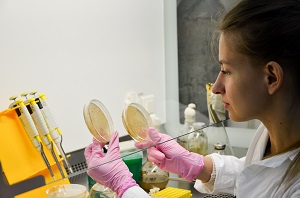Rosneft Awarded for Developing Unique Biological Product

Rosneft has been awarded by the Rospatent in the category “100 Best Inventions of Russia for 2019 and the H1 2020” for the development of a unique biological product for cleaning the northern seas of oil pollution. The project for the development of the innovative product is being implemented by the Arctic Research and Design Centre (a subsidiary of Rosneft’s corporate research and development complex) and Innopraktika, the non-governmental development institution based on the Faculty of Biology of the Lomonosov Moscow State University.
The technology is based upon the application of natural psychrophiles (low-temperature bacteria) that use hydrocarbons as their feed source and is designed to clean the coastline and waters of the northern seas of oil pollution. The innovative biological preparation was developed in stages. At first, scientists established around 100 bacteria capable of decomposing oil and petroleum products at low temperatures, including those below zero. Over 250 samples of water were taken from major Northern ports and the coastline of Northern cities, such as Murmansk, Vladivostok, Petropavlovsk-Kamchatsky, etc. For a number of strains, the hydrocarbon consumption rate was more than 70% in 14 days of the experiment. All microorganisms are endemic microflora of the northern seas, so their use is environmentally safe.
At stage two, biologists launched the development of a hydrophobic shell that would accommodate the bacteria-based preparation. The hydrophobic shell dissolves at contact with hydrocarbon fraction alone, thus securing the target delivery of the preparation to the contaminated area and increasing its efficiency.
The preparation has already showed success in lab trials. Field trials of the product are scheduled at the Laboratory for Flow-Through Marine Systems at the Pertsov Belomorskaya Biological Research Station of the Moscow State University. The Laboratory’s building is being upgraded with the support of Rosneft. Flow-through sea life aquariums allow testing the new product with no impact on the Arctic ecosystem and confirming its high potency and safety for use in-situ.
High standards of environmental safety are one of the cornerstones of the Rosneft-2022 Strategy. Environment protection is an integral part of the Company’s corporate culture and social responsibility. At every of its business, Rosneft pays special attention to securing the environment, protecting and restoring natural resources.
Note for Editors:
The Company’s green investments have amounted to 80 billion roubles in the last two years. The funds have been allocated to implement key projects in associated petroleum gas (APG) utilisation, pipelines stability improvement, water and waste management, land restoration, and biological diversity preservation.
Modern methods of cleaning water ecosystems from oil contamination are divided into mechanical (collection and limitation of further spreading); chemical (use of dispersants and coagulants); physical and chemical (burning); and biotechnological. Most of the known biotechnological clean-up methods are based on the use of preparations containing certain types of microorganisms in combination with various substances or methods that stimulate their activity. These have proven to be the most efficient and most natural means of utilizing hydrocarbon contaminations. Microbial-based clean-up technologies complement traditional approaches, providing much more complete utilization of petroleum products.
Rosneft
Information Division
August 25, 2020